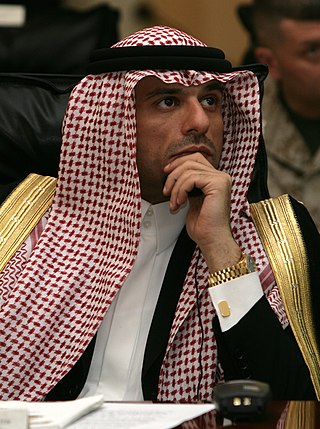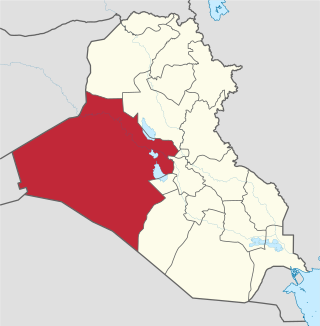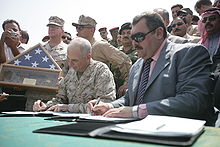
Al Anbar Governorate,or Anbar Province,is the largest governorate in Iraq by area. Encompassing much of the country's western territory,it shares borders with Syria,Jordan,and Saudi Arabia. The population is mostly Sunni Arabs. The provincial capital is Ramadi;other important cities include Fallujah,Al-Qa'im and Haditha.

An Iraqi insurgency began shortly after the 2003 American invasion deposed longtime leader Saddam Hussein. It is considered to have lasted until the end of the Iraq War and U.S. withdrawal in 2011. It was followed by a renewed insurgency.
Events in the year 2005 in Iraq.

Haditha is a town in the Al Anbar Governorate,about 240 km (150 mi) northwest of Baghdad. It is a farming town situated on the Euphrates River. Its population of around 46,500 people,predominantly Sunni Muslim Arabs. The town lies near the Buhayrat al Qadisiyyah,an artificial lake which was created by the building of the Haditha Dam,the largest hydroelectric facility in Iraq.

The Second Battle of Ramadi was fought during the Iraq War from March 2006 to November 2006,for control of the capital of the Al Anbar Governorate in western Iraq. A joint US military force under the command 1st Brigade Combat Team,1st Armored Division and Iraqi Security Forces fought insurgents for control of key locations in Ramadi. Coalition strategy relied on establishing a number of patrol bases called Combat Operation Posts throughout the city.
Events in the year 2007 in Iraq.

Abdul Sattar Abu Risha –Sheikh Abdul Sattar Eftikhan al-Rishawi الشيخعبدالستارافتيخانالريشاوي–was a high-profile Iraqi tribal sheikh of the Abu-Risha tribe. He was the leader of an alliance of Iraqi Sunni Arab tribes that opposed al-Qaeda in Iraq.

The Sons of Iraq or al-Sahwah were a coalition in the Al Anbar province in Iraq between Sunni tribal leaders as well as former Ba'athist Iraqi military officers that united in 2005 to maintain stability in their communities. A moderate group,they were initially sponsored by General Petraeus and the US military.
Dulaim or Dulaimi or Al Duliam or Dulaym is an Arab royal tribe,with over seven million members. The tribe's history goes back to pre-Islamic times and members reside today in Iraq and neighboring countries such as Syria,Kuwait and Jordan.

The Anbar campaign consisted of fighting between the United States military,together with Iraqi security forces,and Sunni insurgents in the western Iraqi governorate of Al Anbar. The Iraq War lasted from 2003 to 2011,but the majority of the fighting and counterinsurgency campaign in Anbar took place between April 2004 and September 2007. Although the fighting initially featured heavy urban warfare primarily between insurgents and U.S. Marines,insurgents in later years focused on ambushing the American and Iraqi security forces with improvised explosive devices (IEDs),large scale attacks on combat outposts,and car bombings. Almost 9,000 Iraqis and 1,335 Americans were killed in the campaign,many in the Euphrates River Valley and the Sunni Triangle around the cities of Fallujah and Ramadi.

The 2012–2013 Iraqi protests started on 21 December 2012 following a raid on the home of Sunni Finance Minister Rafi al-Issawi and the arrest of 10 of his bodyguards. Beginning in Fallujah,the protests afterwards spread throughout Sunni Arab parts of Iraq. The protests centered on the issue of the alleged sectarianism of Prime Minister Nouri al-Maliki. Pro-Maliki protests also took place throughout central and southern Iraq,where there is a Shia Arab majority. In April 2013,sectarian violence escalated after the 2013 Hawija clashes. The protests continued throughout 2013,and in December Maliki used security forces to forcefully close down the main protest camp in Ramadi,leaving at least ten gunmen and three policemen dead in the process.
The 2013 Hawija clashes relate to a series of violent attacks within Iraq,as part of the 2012–2013 Iraqi protests and Iraqi insurgency post-U.S. withdrawal. On 23 April,an army raid against a protest encampment in the city of Hawija,west of Kirkuk,led to dozens of civilian deaths and the involvement of several insurgent groups in organized action against the government,leading to fears of a return to a wide-scale Sunni–Shia conflict within the country. By 27 April,more than 300 people were reported killed and scores more injured in one of the worst outbreaks of violence since the U.S. withdrawal in December 2011.
From 15 to 21 May 2013,a series of deadly bombings and shootings struck the central and northern parts of Iraq,with a few incidents occurring in towns in the south and far west as well. The attacks killed at least 449 people and left 732 others injured in one of the deadliest outbreaks of violence in years.
Raja Nawaf Farhan al-Mahalawi was the Governor of Iraq's Al Anbar province,serving from January 2005 until his death in May 2005.

Beginning in December 2012,Sunnis in Iraq protested against the Maliki government. On 28 December 2013,a Sunni MP named Ahmed al-Alwani was arrested in a raid on his home in Ramadi. Alwani was a prominent supporter of the anti-government protests. This incident led to violence in Al Anbar Governorate between the Iraqi Army and a loose alliance of tribal militias and other groups fighting alongside the Islamic State of Iraq and the Levant (ISIL).

Ali Hatem Abd al-Razzaq Ali al-Suleiman al-Assafi al-Dulaimi,better known as Ali Hatem al-Suleiman,is an Iraqi Sunni tribal leader who is the leader of the Dulaim tribe,in the Al Anbar Governorate.
The following lists events the happened in 2013 in Iraq.
The Battle of Ramadi,also called the Fall of Ramadi,was part of an ISIL offensive to capture all of the Anbar Province. Ramadi was one of the Iraqi government's last strongholds in Anbar,after ISIL's success in a previous campaign. The battle began in November 2014,and drew to a close on 14 May 2015,as Islamic State of Iraq and the Levant (ISIL) insurgents seized hold of government buildings. On 17 May,the Iraqi Army and special forces fled the city,with 500 civilians and security personnel dead.

The Al-Karmah offensive,codenamed Fajr al-Karma,was an offensive launched by the Iraqi Army and anti-ISIL Sunni tribal fighters to recapture the Al-Karmah district taken by the Islamic State of Iraq and the Levant in Iraq. The offensive began on 14 April 2015. During the offensive the anti-ISIL forces captured part of the city of Al-Karmah,and the old road of Al-Karmah.










